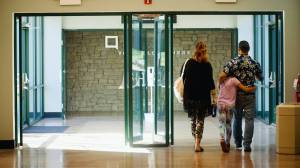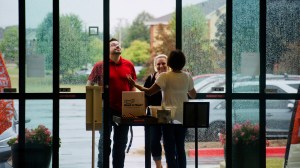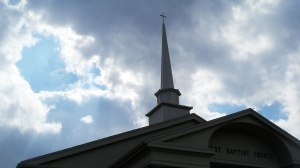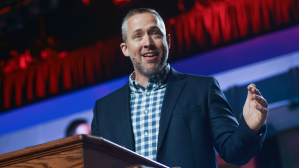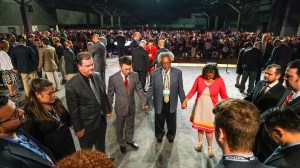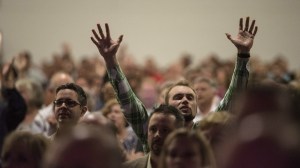In this series

The Southern Baptist Convention (SBC) saw its largest membership decline in more than a century last year, and church attendance has not rebounded to pre-pandemic levels, even though a significant surge in baptisms has Baptists optimistic.
Reported SBC church membership fell from 13,680,493 in 2021 to 13,223,122 last year, according to the Annual Church Profile released this week by Lifeway Christian Resources.
The nation’s largest Protestant denomination continued its slow, steady decline, down from a peak of 16.3 million in 2006. But it hasn’t seen an annual decrease this big in more than a century, when an exodus of Black churches followed the Civil War.
The total number of SBC churches in 2022 came in at 46,614—down less than 1 percent from 47,198 the previous year. Church attendance increased more than 5 percent to 3,804,665. Still, that is well below the SBC’s pre-pandemic average of 5.3 million in 2019.
One area of promise in the latest statical report was baptisms, Southern Baptists’ key statistical measure of evangelistic progress.
The 180,177 people baptized at Southern Baptist congregations 2022 marked a 16 percent increase over 2021. As with attendance, however, that was still below pre-COVID levels. The SBC reported 235,748 baptisms in 2019, 31 percent more than last year’s total.
“I think I speak for most Southern Baptists when I say that I care about people, not numbers. Numbers are valuable to the degree that they give us a checkup on how well we are serving people in Christ’s name,” said SBC president Bart Barber, pastor of First Baptist Church in Farmersville, Texas. “In this case, increases in attendance and baptisms are good. They celebrate the accomplishment of the very ways we said that we wanted to care for people by sharing the gospel in our 2016 resolution ‘On Evangelism and Soul-Winning.’”
The decrease in church membership “is more difficult to analyze,” he said. “It may very well be that our membership numbers have declined because we are pursuing the ways we wanted to care for our inactive members in our 2008 resolution ‘On Regenerate Church Membership and Church Member Restoration.’”
That resolution urged churches “to maintain accurate membership rolls for the purpose of fostering ministry and accountability among all members of the congregation.”
This year’s annual report, released by Lifeway Research, was drawn from the 69 percent of SBC churches that submitted data. Scott McConnell, executive director of the SBC’s research arm, thinks more accurate membership rolls may indeed be a factor in the membership decrease.
“Much of the downward movement we are seeing in membership reflects people who stopped participating in an individual congregation years ago and the record keeping is finally catching up,” McConnell said. “Membership totals for a congregation immediately reflect additions as well as subtractions due to death or someone removing themselves from membership. But many congregations are slow to remove others who no longer are participating.”
Still, the report left some analysts asking if the SBC’s current trajectory is sustainable. No, says Ryan Burge, a political scientist at Eastern Illinois University who tracks data on American religion.
While SBC church membership has declined since 2006, the number of baptisms annually exceeded the number of members lost until recently. But since 2019, members lost have exceeded total baptisms each year, according to Burge’s analysis. In 2012, there were three baptisms for every member lost. A decade later, there were 2.7 members lost for every baptism.
“That math just ain’t mathing,” Burge wrote. “No denomination can sustain losses like the SBC is experiencing and not be fundamentally changed.”
There were bright spots in the SBC’s latest statistical report. Among them: financial giving and small group attendance.
Total undesignated receipts at Southern Baptist churches topped $9.9 billion in 2022, a nearly 2 percent increase from 2021. That figure also represents an increase from the pre-pandemic level of $9.6 billion in 2019.
Small group participation in Southern Baptist churches increased nearly 4 percent to 2.3 million. Yet that figure, like worship attendance, remains below the pre-COVID level of 3.2 million in 2019.
Data from some individual states also offered encouraging signs. Nationally, Southern Baptist congregations averaged one baptism for every 73 church members. In Iowa, however, the ratio was one baptism for every 15 church members. Iowa also was among only a handful of states where Southern Baptist church attendance exceeded total church membership.
Tim Lubinus, executive director of the Baptist Convention of Iowa, said strong college ministry and a trend away from church membership help explain his state’s outlying numbers.
“We have very strong collegiate ministry here, and students often attend without joining,” Lubinus said. Additionally, “people don’t value joining a church as a member as much as they could or should or have in the past. They participate and feel like a member when they haven’t actually gone through a membership process.”
Lubinus takes the overall reported declines in the SBC with a grain of salt. When dwindling churches close their doors, he said, that can cause dozens or even hundreds of people to disappear from Southern Baptist membership rolls even though church attendance hasn’t been at that level in years. He isn’t sure precisely why the SBC is declining in membership and churches, but he said working to make disciples is a more productive use of time than poring over the stats.
“Our response is the same as if the report was positive,” he said. “Tomorrow morning, we need to be faithful in our work to proclaim the gospel, to love our neighbors, and to disciple our churches. To try to put our finger on the problem is probably more unhelpful than actually spending our time discipling people and sharing our faith.”
Barber agrees, and he’s optimistic about the SBC’s future.
“This much seems certain,” he said, “continued increases in attendance and baptism will, if this trend continues, leave us little room to worry about the long-term future of our church membership numbers.”
David Roach is a freelance reporter for CT and pastor of Shiloh Baptist Church in Saraland, Alabama.



